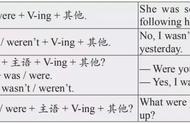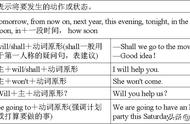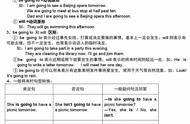一般将来时表示将来某个时间要发生的动作或存在的状态,常与表示将来的时间状语连用,如:tomorrow,tomorrow afternoon,next week,next year,in two days,the day after tomorrow等。
一般将来时的构成:1.will 动词原形
肯定句:主语 will 动词原形 其他.
否定句:主语 will not 动词原形 其他.
一般疑问句:Will 主语 动词原形 其他?
特殊疑问句:特殊疑问词+will+主语+动词原形 其他?
eg:肯定句:They will see a film tomorrow .明天他们将会去看电影。
否定句:They won't see a film tomorrow .明天他们不会去看电影。
一般疑问句:Will they see a film tomorrow?明天他们会去看电影吗?
特殊疑问句:When will they see a film?他们什么时候去看电影?
2.be going to 动词原形
肯定句:主语 be(am/is/are) going to 动词原形 其他.
否定句:主语 be(am/is/are) not going to 动词原形 其他
一般疑问句:Be(am/is/are) 主语 going to 动词原形 其他?
特殊疑问句:特殊疑问词+be+主语+going to+动词原形 其他?
【注】will 没有人称和数的变化。will结构多用于表示客观上将要发生的事情,但很多情况下可与be going to结构互换使用。
eg:肯定句:He is going to play basketball next Monday .
下周一他将要去打篮球。
否定句:He isn't going to play basketball next Monday .
下周一他将不去打篮球。
一般疑问句:Is he going to play basketball next Monday ?
他下周一去打篮球吗?
特殊疑问句:What is he going to do next Monday ?
他下周一打算做什么?
好啦!这么简单的知识怎么能难倒你呢!下期咱们再见!

























